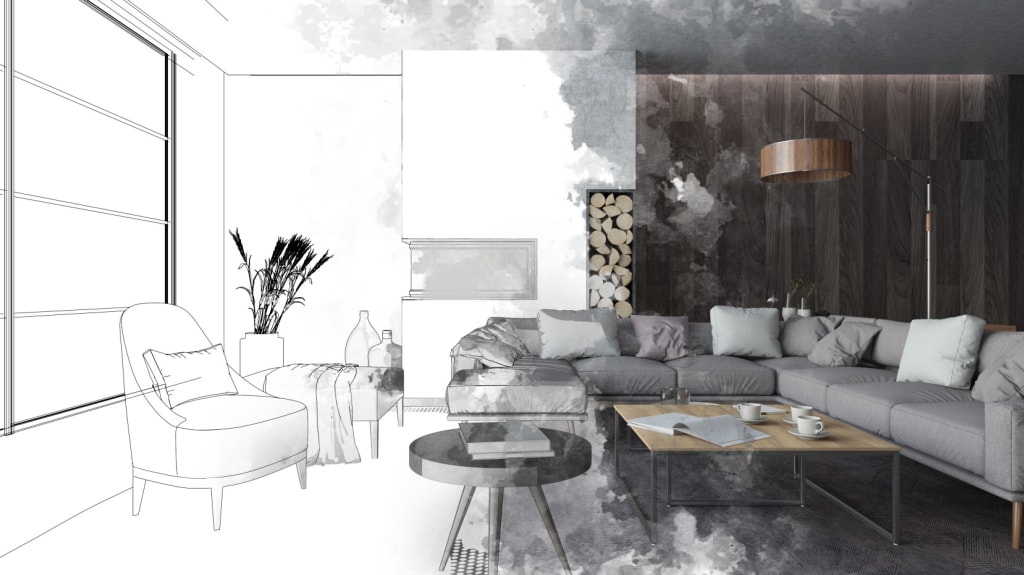Your home is a reflection of who you are. It’s a sanctuary that should bring you joy and comfort. So, of course, you can tell when it’s missing something. However, nailing down what exactly needs to change can be tough, especially if you want an aesthetic, cohesive design. This is where professional interior design services come in. Whether you’re looking to resell, renovate, or redecorate, these experts have the knowledge, skills, and expertise to help you transform your home into a stunning and functional space. Let’s explore the benefits of hiring an interior designer and how they can help. Who knows, maybe you’ll fall in love with your home all over again.
Benefits of an interior design service
Interior design services exist to help lift some of the weight of your renovation off your shoulders. They save you some of the trouble of swimming through oceans of sofas online or drowning in paint chips in your living room. Here are some of the benefits of hiring an interior designer or design team.
Expert guidance to help you define your style and what’s important to you
Realistic goal setting based on your needs and budget
Access to a network of skilled professionals
Project supervision and management – fewer mistakes on site and solutions to unexpected issues
Potential discounts on products from partners and suppliers
Personal shopping for finishes and materials
Custom layout and decor solutions to create beautiful, functional spaces

Interior design process
Interior design services don’t just focus on making a room look aesthetically pleasing – they work with homeowners to create a space that reflects their personality and meets their needs. Let’s go over the steps involved so that you know what to expect when working with an interior designer.
Understanding your needs
To create the best space possible for you, a good interior designer will take the time to assess all your needs. This means getting to know how you use your existing space, noting any special needs or accommodations, and, most importantly, how you want to feel when you walk in. The more you open up to your designer or team, the better they will be able to bring your vision to life.
Generating floor plans
During early meetings with your designer, they’ll take measurements of the room(s) you would like to update. These will be used later to create a floor plan of your current space or prospective space if layout changes are part of your project. It’s a key part of the design process.
Floor plans will be used to decide what fits in the room and goes together while leaving room for living. Many people struggle to understand how to use their space effectively, particularly if there are mobility concerns. When the plans have been approved, you’ll move on to discussing aesthetics and finishes.

Crafting a design concept and mood board
Once your designer or team understands your vision, they will mold it into a design concept and create a mood board. These are the beacons that will direct every design choice from this point on. The design concept is a document that outlines the overall idea for the design, and the mood board is a mix of colours and images that convey the mood being crafted within the space. Designers use these tools to guide them and ensure every decision they make is in service to your dream.
An interior designer will usually present their ideas in a showroom or in person with some samples so that you can see the colours and feel the textures of the chosen materials (wood, tiles, countertop material, wallpaper, etc.). For larger pieces such as lighting and furniture, photos are provided. Your designer will schedule an in-store visit for you to confirm certain choices or simply order them online if you approve the finishes.
Shopping list creation
Your interior designer will create a shopping list that includes items from the floor plan as well as possibly some other decorative pieces for the space. A good shopping list will include details such as item dimensions, price, and source. Designers can guide you to the best option, be it the best price or the highest quality. You can ask your designer to purchase and store the items for you until the final stages of the renovation (if it’s a service they offer) or choose to purchase and store them yourself. This is a valuable tool for ensuring that you and your designer are on the same page about how your money is being spent.

Types of interior design services
Whether you’re remodelling your home or starting from scratch, hiring an interior designer can make all the difference. Keep in mind that there are typically two types of interior designers to choose from: generalists (those that work with a variety of styles) and specialists (those that offer one specific style).
Here are the different types of interior design services available to help you gain a better understanding of how these professionals can turn your vision into reality. From space planning to colour consultations, each service offers unique benefits that can elevate your home to new heights.
Design consultations
If you’re looking for expert advice, ideas, and guidance for your home improvement project – without a (large) financial commitment – then this interior design service is an excellent choice.
Many firms offer design consultations either as a standalone service (e.g., colour palettes, home staging, sustainability) or as part of a larger offering (e.g., a full-service design package). And, depending on the company, they can be free of charge (~30 min) or a paid-for service (1–2 h) and can take place in person or virtually.
During the consultation, you’ll discuss your current challenges with the existing space and what you’d like to see it become. In turn, the designer will offer suggestions on how to best showcase and make use of the space based on your vision. They may show examples of their past work that’s similar to what you have in mind, and they can help you establish a budget if you’re not sure where to begin.
Full-service interior design
If you’re on the go and don’t have time to meet someone at an office or store, full-service interior design is a dream come true. This option gives homeowners a more hands-off approach – the firm or designer will manage the renovation or decoration project from start to finish. Once complete, all you have to do is walk into your home and enjoy!
The firm or interior designer does most of the work in full-service design. Once they have a firm grasp of your vision, they’ll draft a floor plan and layout, source products, and manage skilled tradespeople. They’ll provide regular status reports, as well as keep track of your budget and timeline. Communication and meet-ups are flexible to help you fit a renovation into your busy lifestyle.

Virtual design services
Thanks to technology (and the normalization of working from home), accessing interior design services has never been easier. Plus, the lack of brick-and-mortar locations allows firms to lower their operational costs and, in turn, their prices. This option brings interior design services directly to your home, even if you live in a rural area where you may otherwise have struggled to find items and materials you like.
Much like in-person offerings, the interior design firm (or expert, if working with a third party) will find the best layout and decor that fits your needs, style, and budget. All communication is done via email, phone, and/or video chat. In addition, it’s extremely convenient – you are managing and executing the project. Everything is done at your pace, according to your schedule.
Bonus: Many online interior design services will take on the small projects (e.g., a single room) that full-service teams often pass on. In addition, they’ll tell you if an in-person home visit is needed to get a better feel of the space and offer the best service for you.
In-store design services
Some furniture and home décor shops offer in-store design services. While their specialists are limited to the store’s products, they can help you create beautiful rooms and find pieces that fit your needs.
The specific services available, as well as their price points, will vary based on the brand. For example, Ikea offers home design consultations and services at flat rates. Some companies, like Toronto-based Salt by the Caza, waive the fee for home styling services if the client spends a certain amount on their products. Lastly, some chain stores like Urban Barn, Crate&Barrel, and Ciot offer design services free of charge.

Working with an interior designer or team
Finding the right interior designer can be a daunting task. Not only do you want someone who is skilled and experienced, but you also need someone who understands your style and can bring it to life. Here are some steps you can take to ensure that you make the right choice.
Identifying your personal style and preferences
Hiring an interior designer can be incredibly helpful in creating your ideal home, but only if you can tell them what you want. Designers are there to take your ideas and refine them into one cohesive look. To do that, you need to give them a starting point.
Take some time to browse interior design trends on websites, in magazines, and on social media. Create a collage of inspiring interior decor photos using Pinterest or Milanote. Take note of any emerging trends in your favourite styles. Knowing if you want something modern or classical, cool or warm, industrial or natural, and so on will help a designer or team understand your vision.
If you like many styles or aren’t sure what direction to take, don’t worry. A good designer will be able to guide you in the right direction by asking the right questions. They’ll take note of the home’s current style, the furniture you currently have, and any pieces you plan to keep.

Finding a professional
Once you have an idea of what you like, it’s time to find designers whose style matches your taste and budget. First, consider what type of designer you would like to hire. If you’re looking to renovate a specific room in your home, such as the kitchen, then you may want to hire a specialist like a kitchen designer. A more generalized interior designer or firm would make more sense for larger, multi-room projects.
Be sure to choose someone whose style matches what you would like for your space. Social media can be a helpful tool for this; just be sure the designers you research are willing to work in your area. Talk to them and see which ones understand you and your vision best. Good communication and a strong connection from the get-go will help ensure a lovely experience with your designer!
Examining their portfolio
A portfolio can be many things; it can be a website, an Instagram page, or even a physical manifest of a designer’s floor plans, drawings, and renderings generated through design software like Chief Architect. More experienced designers tend to have larger portfolios featuring images of past projects, while newer designers may only have renderings and layouts.
When considering interior design services, take your time and really focus on the details in the professional’s portfolio. See how well their design style matches your own and take note of their skill level. Ask them what their strengths and weaknesses are, as well as what types of projects they prefer. In short, see if they’re the right fit for you!

Checking references and credentials
While a designer’s floor plans and sketches can give you an idea of their sense of style and creativity, they can’t show you their ability to execute the project. This is where a reference check comes in handy – reach out to past clients, browse reviews on social media, and check for complaints to see if any major issues have cropped up.
For instance, if your designer tends to be responsive, understanding, and professional, then you will feel that much more comfortable having them in your home. If the person you are looking to hire has a history of finishing projects late and over budget, you may want to know about that too. References give you a clear picture of what you are getting yourself into.
Be sure to ask for their credentials, as well. While recent graduates can create stunning spaces, some homeowners may feel more comfortable hiring someone more experienced. In those cases, see if they have been certified by the National Council for Interior Design Qualification and if they’re a member of a governing body, such as the Association of Registered Interior Designers of Ontario, Interior Designers of Canada, or the Association professionnelle des designers d’intérieur du Québec (in French).
Establishing a budget and outlining expectations
Talking about money can make just about anyone feel uncomfortable. Unfortunately, money is a topic you can’t escape when you decide to renovate your home. You need to be honest with yourself and your designer about what you are willing to spend. When you are delivering your budget, be sure it includes what you’re willing to spend for the designer’s fee. You don’t want to decide you can spend $20,000 renovating your kitchen, fall in love with a design online, get approved for a loan, and reach out to the designer thinking you can afford it only to discover the designer charges a $5,000 fee for their work. It is much better to decide at the beginning on a ceiling for how much you are willing to spend; the designer can then deduct their fee from that number. This way they can better let you know what they can realistically deliver without it costing more than you can afford.
Finalizing your interior design project
Once you and your designer or team have hammered out the details of the remodel, it is time to sign on the dotted line. Most competent professionals will have you sign a contract before beginning work on your project. This should outline the expectations you both have going into the project including timeline, budget, and a description of the work to be completed. It’s a crucial step in ensuring everyone is protected should anything happen before, during, and even after project completion.
You can also choose to hire an interior designer at an hourly rate. With this option, there is less of a commitment – you can simply pay for their services as needed during your project.


Explore your home’s potential with an interior designer
Interior designers are there to help you through the ups and downs of remodelling your home. From creating a stunning modern kitchen to a more accessible home, they can help you discover new possibilities for your home’s layout, colour palette, and overall aesthetic. Explore completed projects, learn about high-ROI renovations, and discover the latest home trends. Together, you can create a space that reflects your unique style and personality.





